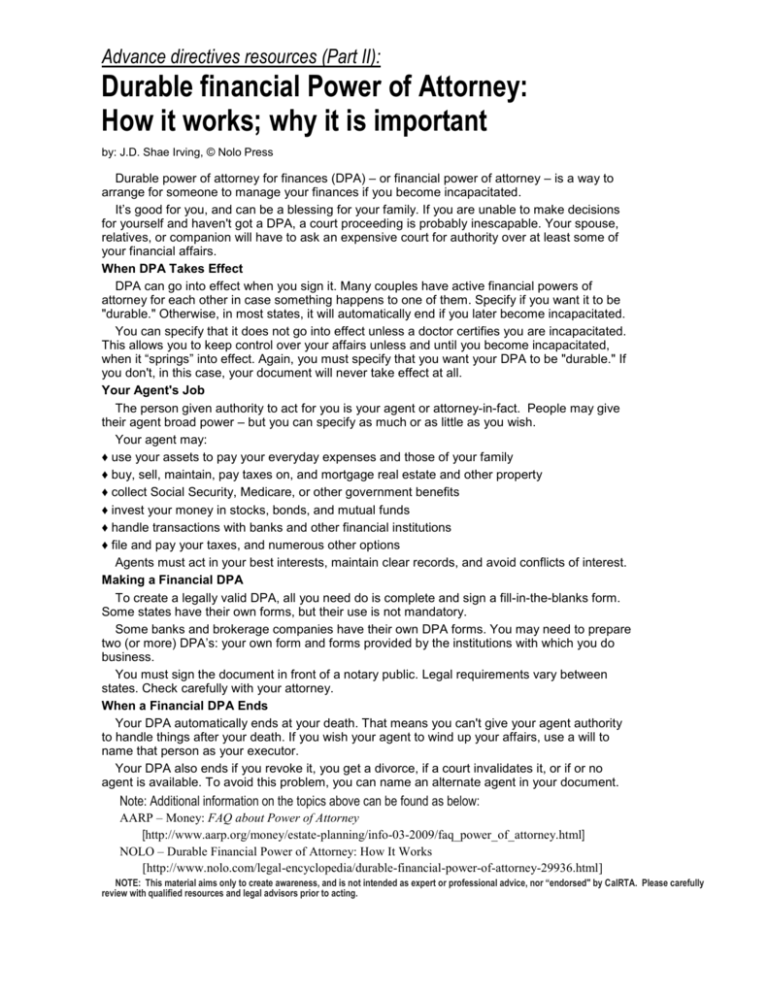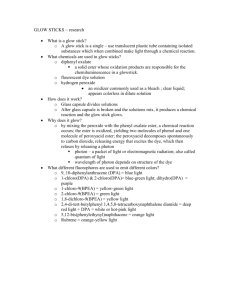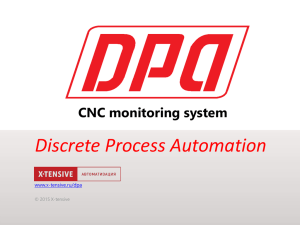Word Doc
advertisement

Advance directives resources (Part II): Durable financial Power of Attorney: How it works; why it is important by: J.D. Shae Irving, © Nolo Press Durable power of attorney for finances (DPA) – or financial power of attorney – is a way to arrange for someone to manage your finances if you become incapacitated. It’s good for you, and can be a blessing for your family. If you are unable to make decisions for yourself and haven't got a DPA, a court proceeding is probably inescapable. Your spouse, relatives, or companion will have to ask an expensive court for authority over at least some of your financial affairs. When DPA Takes Effect DPA can go into effect when you sign it. Many couples have active financial powers of attorney for each other in case something happens to one of them. Specify if you want it to be "durable." Otherwise, in most states, it will automatically end if you later become incapacitated. You can specify that it does not go into effect unless a doctor certifies you are incapacitated. This allows you to keep control over your affairs unless and until you become incapacitated, when it “springs” into effect. Again, you must specify that you want your DPA to be "durable." If you don't, in this case, your document will never take effect at all. Your Agent's Job The person given authority to act for you is your agent or attorney-in-fact. People may give their agent broad power – but you can specify as much or as little as you wish. Your agent may: ♦ use your assets to pay your everyday expenses and those of your family ♦ buy, sell, maintain, pay taxes on, and mortgage real estate and other property ♦ collect Social Security, Medicare, or other government benefits ♦ invest your money in stocks, bonds, and mutual funds ♦ handle transactions with banks and other financial institutions ♦ file and pay your taxes, and numerous other options Agents must act in your best interests, maintain clear records, and avoid conflicts of interest. Making a Financial DPA To create a legally valid DPA, all you need do is complete and sign a fill-in-the-blanks form. Some states have their own forms, but their use is not mandatory. Some banks and brokerage companies have their own DPA forms. You may need to prepare two (or more) DPA’s: your own form and forms provided by the institutions with which you do business. You must sign the document in front of a notary public. Legal requirements vary between states. Check carefully with your attorney. When a Financial DPA Ends Your DPA automatically ends at your death. That means you can't give your agent authority to handle things after your death. If you wish your agent to wind up your affairs, use a will to name that person as your executor. Your DPA also ends if you revoke it, you get a divorce, if a court invalidates it, or if or no agent is available. To avoid this problem, you can name an alternate agent in your document. Note: Additional information on the topics above can be found as below: AARP – Money: FAQ about Power of Attorney [http://www.aarp.org/money/estate-planning/info-03-2009/faq_power_of_attorney.html] NOLO – Durable Financial Power of Attorney: How It Works [http://www.nolo.com/legal-encyclopedia/durable-financial-power-of-attorney-29936.html] NOTE: This material aims only to create awareness, and is not intended as expert or professional advice, nor “endorsed" by CalRTA. Please carefully review with qualified resources and legal advisors prior to acting.







